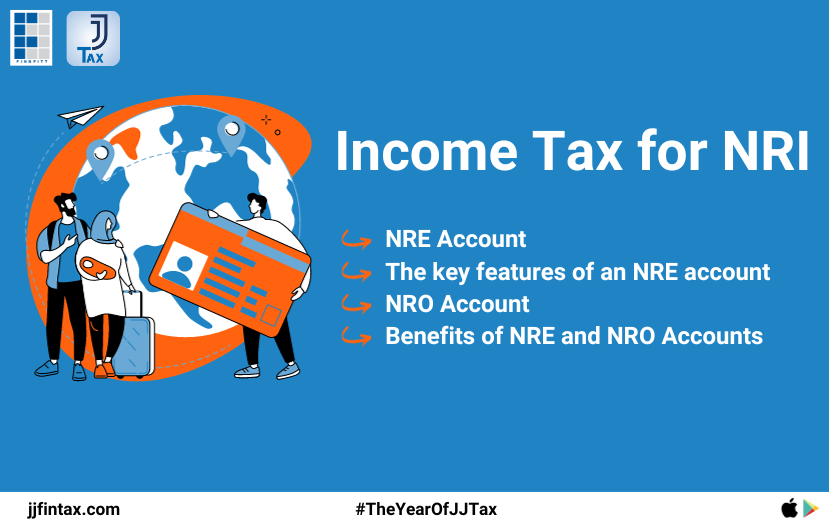Navigating Income Tax Regulations for Non-Resident Indians (NRIs)

Hey there, lovely listeners! Welcome to another episode of "FunnTaxx" where we simplify finances for you. Main hu Shalu aapki host aur mere saath hai hamara dost Hey there, lovely listeners! Welcome to another episode of "FunnTaxx" …………
Today's episode is like a finance love story—NRE and NRO, the true 'Rupee-relationship' statuses for our Non-Resident Indian community.
Sahi pakde hain! It's like your money has its own Facebook relationship status, but in Rupees!
A hundred percent, yaar! Managing your finances as an NRI can be a maze, and these NRE and NRO accounts are like the knights in shining armor.
For sure! And guess what, folks? We've got a treat for you today. We at JJ Tax are in the house, and we've put together this podcast to spill all the beans on NRE and NRO accounts.
Because let's face it, , these accounts are like the Bollywood stars of the NRI finance world—everyone knows about them, but not everyone understands their drama!
Haha, true that! So stick around, grab your chai or coffee, and let's dive into the world of NRE and NRO accounts with the experts at JJ Tax. Let's roll!
Managing your finances as a Non-Resident Indian (NRI) involves navigating a complex landscape of financial instruments and accounts. Among these, the NRE (Non-Residential External) and NRO (Non-Residential Ordinary) accounts play pivotal roles.
At JJ Tax, we understand the significance of these accounts for our NRI clients, which is why we’ve put together this podcast/newsletter, where we'll walk you through these two types of accounts, and explore the benefits they offer to NRIs.
Pehle ye smjh lete hai ki NRE aur NRO accounts hote kya hai ?
NRE Account: The NRE account is a type of bank account that allows NRIs to hold and manage their foreign income in India in Indian Rupees. This account is primarily meant for parking and managing income earned outside India.
The key features of an NRE account include:
1. Repatriation: Funds in an NRE account are freely repatriable, meaning you can transfer both the principal and the interest earned abroad without any restrictions.
2. Tax Benefits: The interest earned on an NRE account is tax-free in India, making it an attractive option for NRIs looking to grow their foreign income without tax implications.
3. Joint Account: NRIs can open joint NRE accounts with other NRIs, but not with resident Indians.
NRO Account: The NRO account, on the other hand, is designed for NRIs to manage their income earned in India. This could include rent, dividends, or any other income generated within the country. Here are the key features of an NRO account:
1. Repatriation Restrictions: While you can repatriate up to USD 1 million per financial year from an NRO account, there are certain restrictions and requirements involved, and the process is not as straightforward as with NRE accounts.
2. Tax Implications: The interest earned on an NRO account is subject to taxation in India. NRIs need to pay tax on the interest income at the applicable rates.
3. Joint Account: NRIs can open joint NRO accounts with other NRIs as well as with resident Indians( close relative)
Ab dono accounts ka Comparison dekh lete hai -
Ab baat kar lete hai Benefits of NRE and NRO Accounts-
1. Tax Efficiency: NRE accounts offer tax-free interest income, helping NRIs maximize their returns on foreign earnings.
2. Full Repatriation: In case of NRE accounts, NRIs can freely repatriate both the principal and interest earned abroad, making it convenient for managing global finances.
3. Currency Protection: NRE accounts are maintained in Indian Rupees, protecting your wealth from currency fluctuations.
4. Local Income Management: NRO accounts are ideal for handling income generated within India, ensuring compliance with Indian financial regulations.
5. Joint Accounts: NRIs can hold joint NRO accounts with both NRIs and resident Indians, facilitating financial transactions with family members.
The benefits of these accounts depend on your purpose and source of income. If you want to maintain your foreign earnings in India and have the flexibility to transfer them abroad, an NRE account would be suitable for you.
If you want to manage your income from India, such as rent, dividends, or pension, an NRO account would be better for you. You can also open both accounts if you have different types of income sources.
As we conclude todays podcast it becomes evident that these financial tools are vital for NRIs to manage their wealth and income in India effectively. The choice between NRE and NRO accounts depends on the nature of your earnings and your financial goals. However, navigating the intricacies of these accounts can be challenging, especially considering the tax implications and repatriation rules.
This is where JJ Tax steps in as your trusted partner. With our deep understanding of the nuances of NRE and NRO accounts, as well as the broader landscape of NRI taxation and financial planning, we are here to simplify the process for you.
Whether you're seeking tax-efficient solutions through NRE accounts or looking to manage your Indian income seamlessly with NRO accounts, JJ Tax can provide you with tailored advice and comprehensive support.
So what’s it going to be NRE or NRO? Your money's 'world tour' or 'staycation' – you decide!…………

